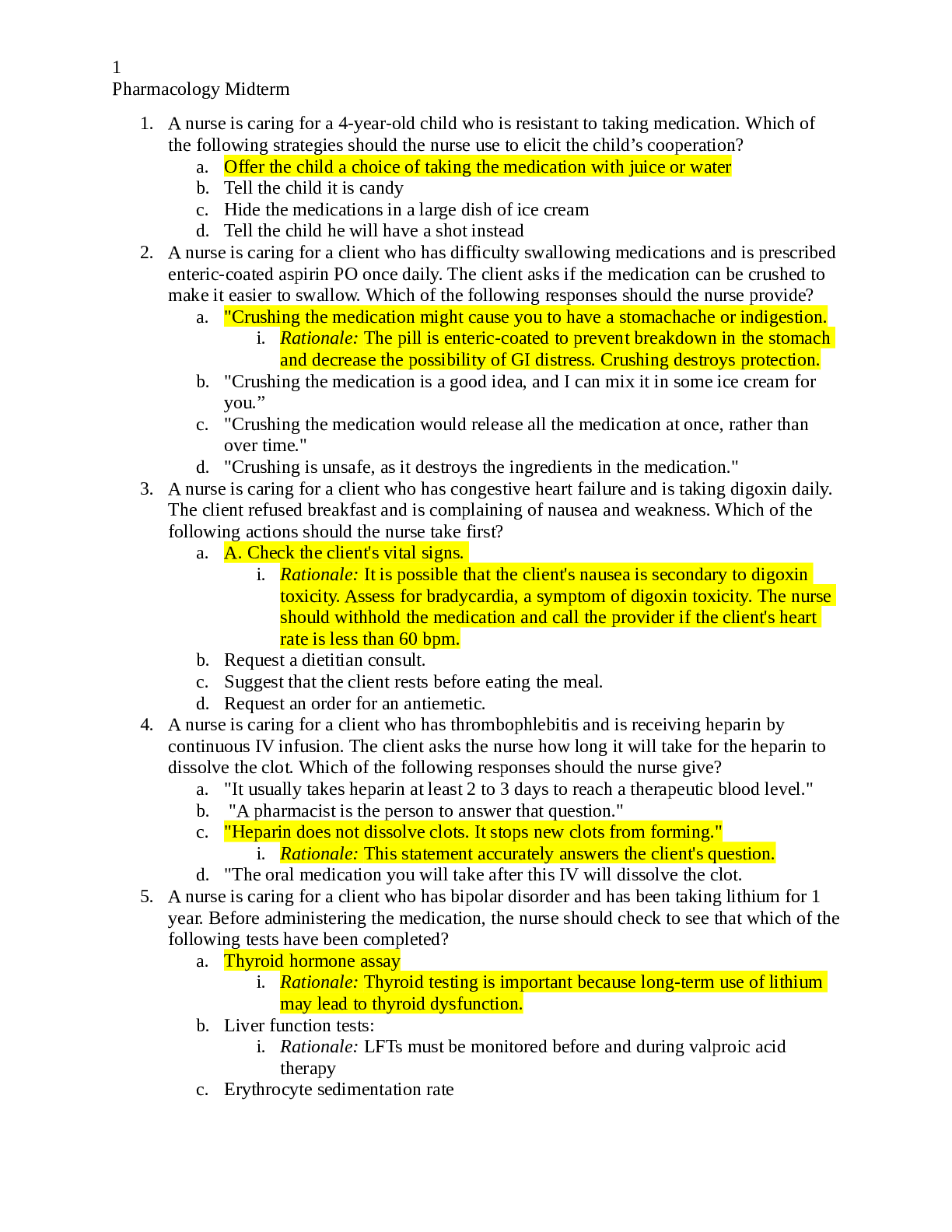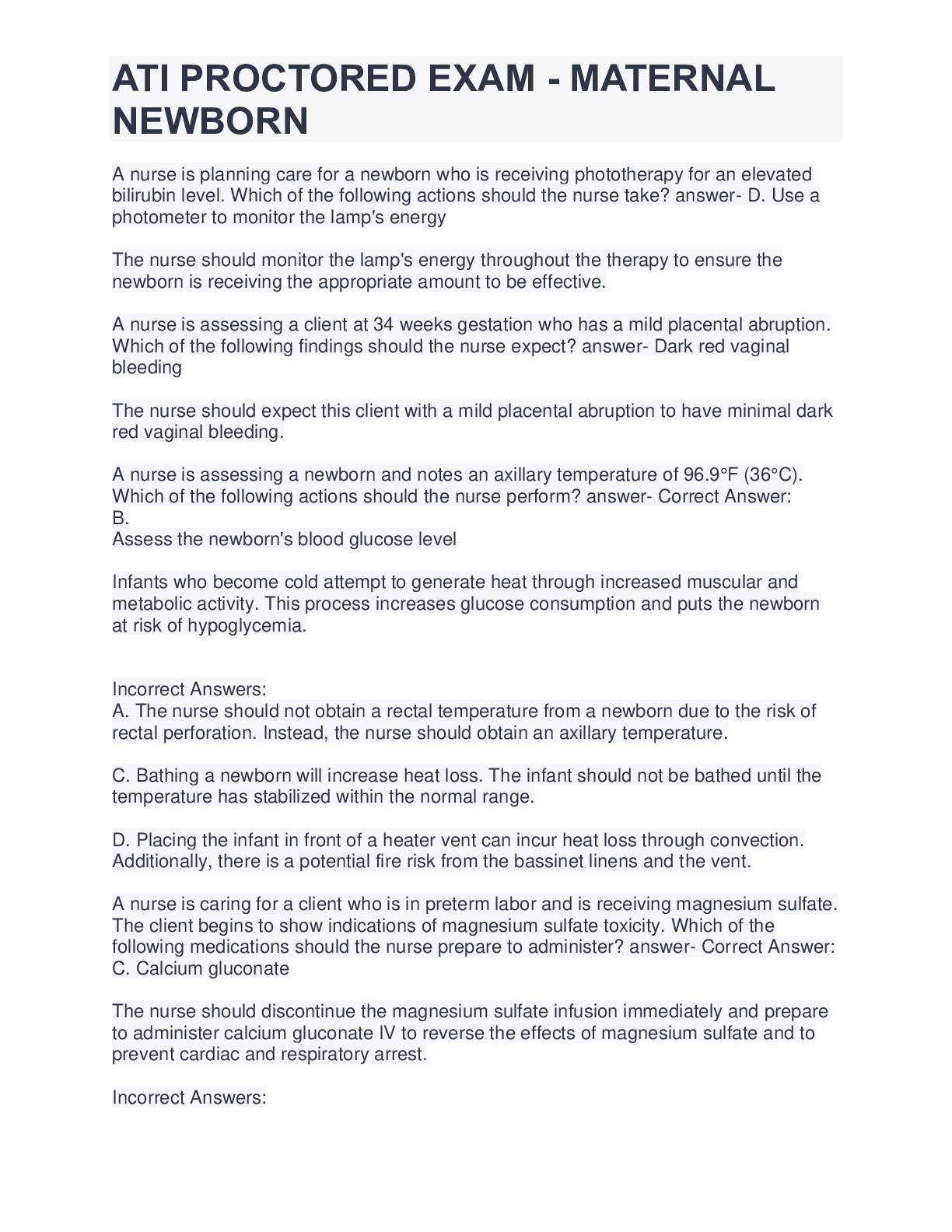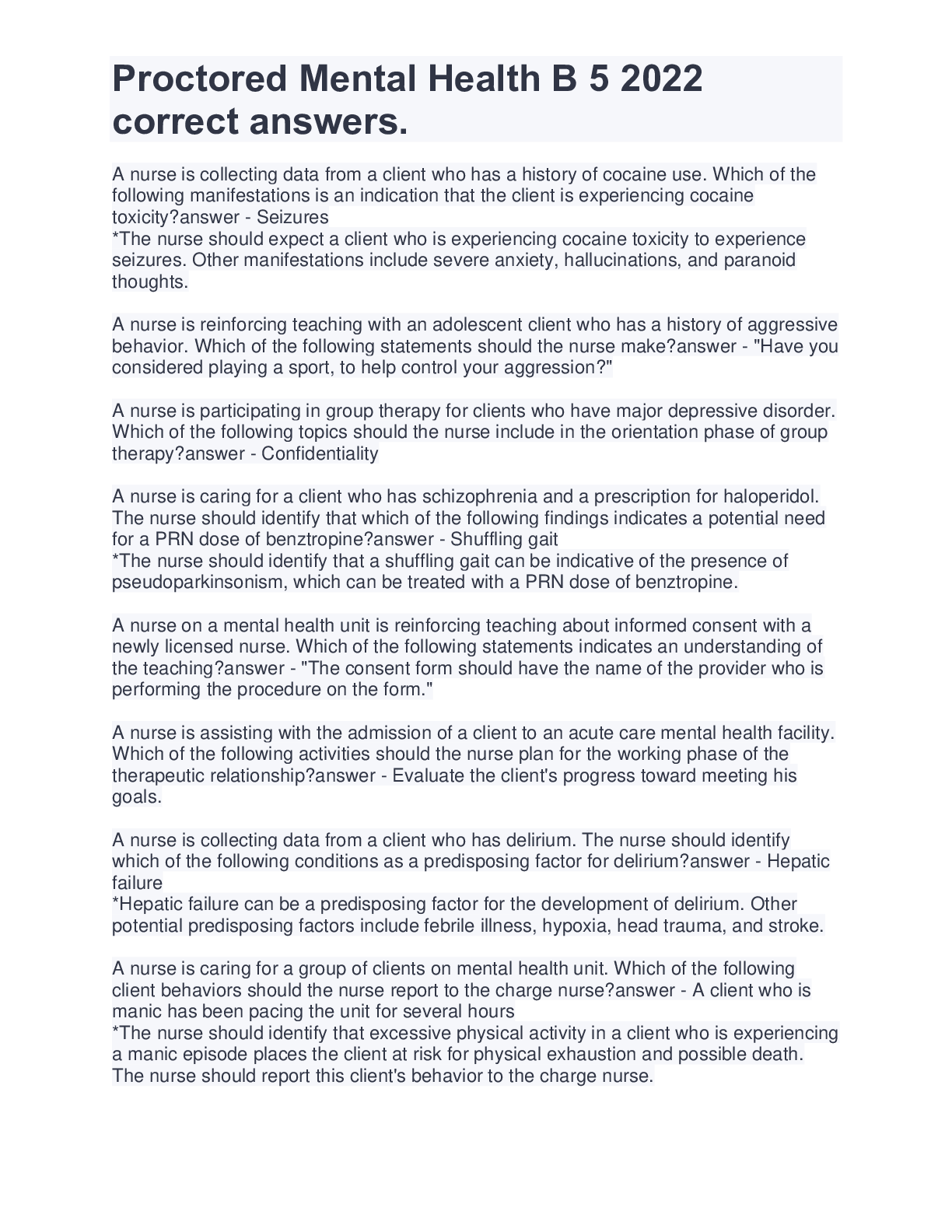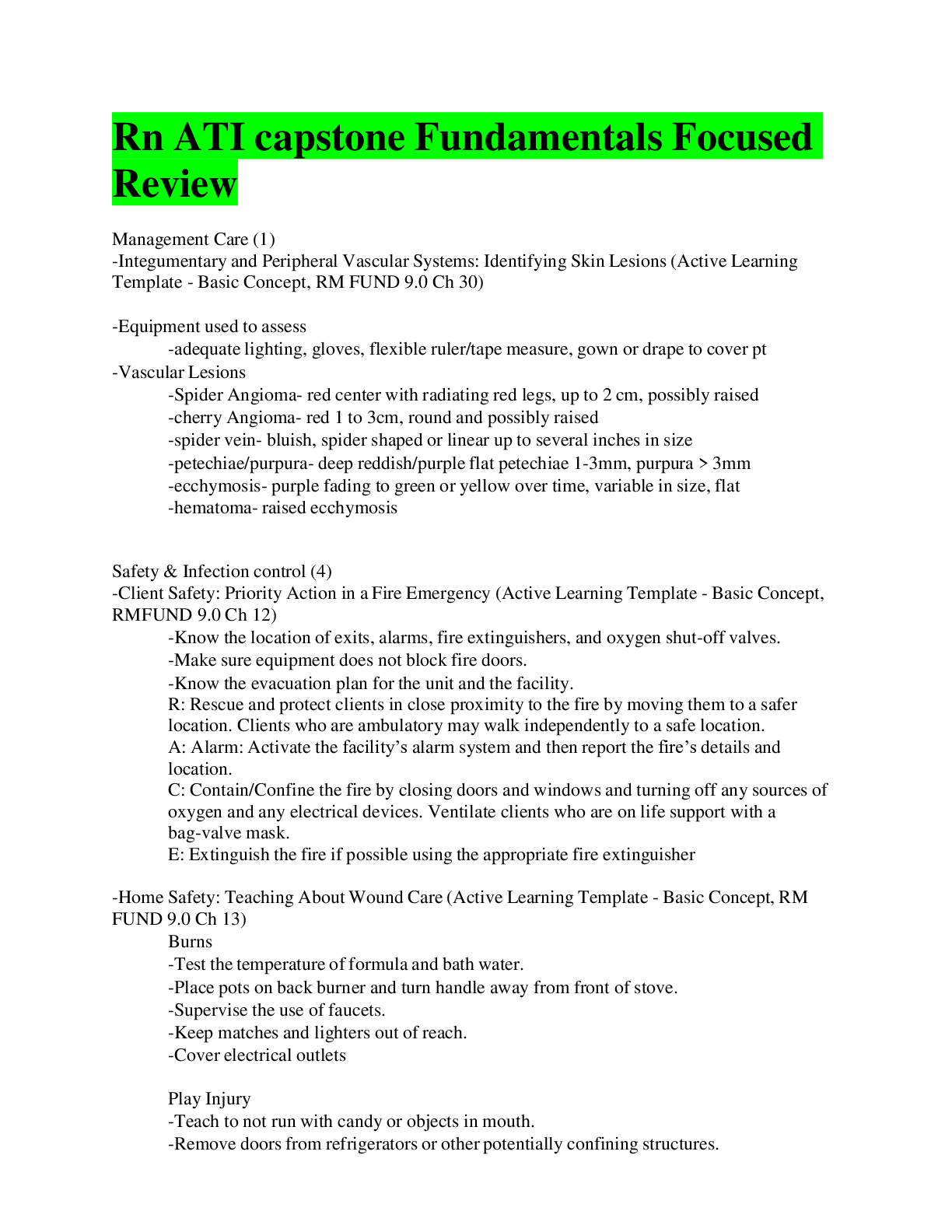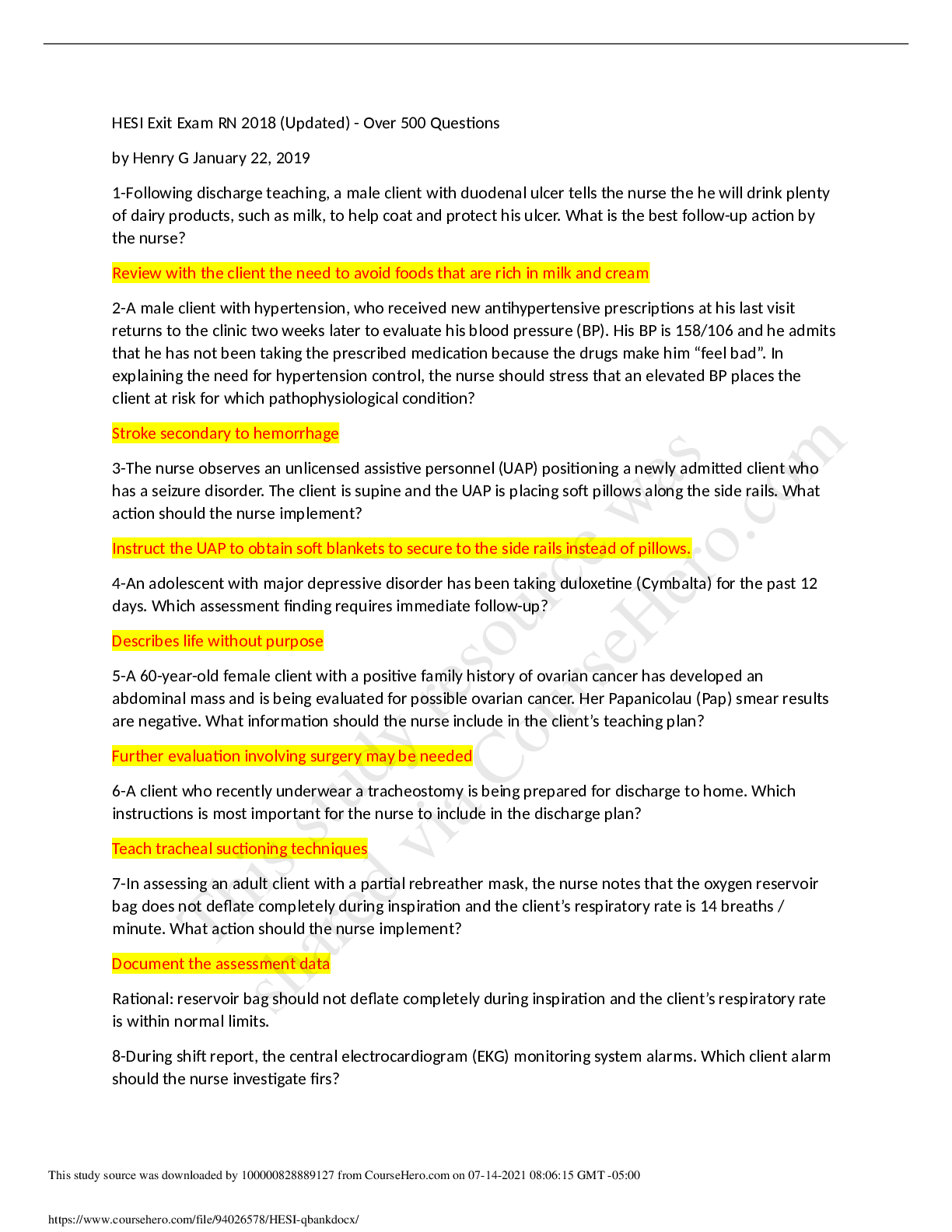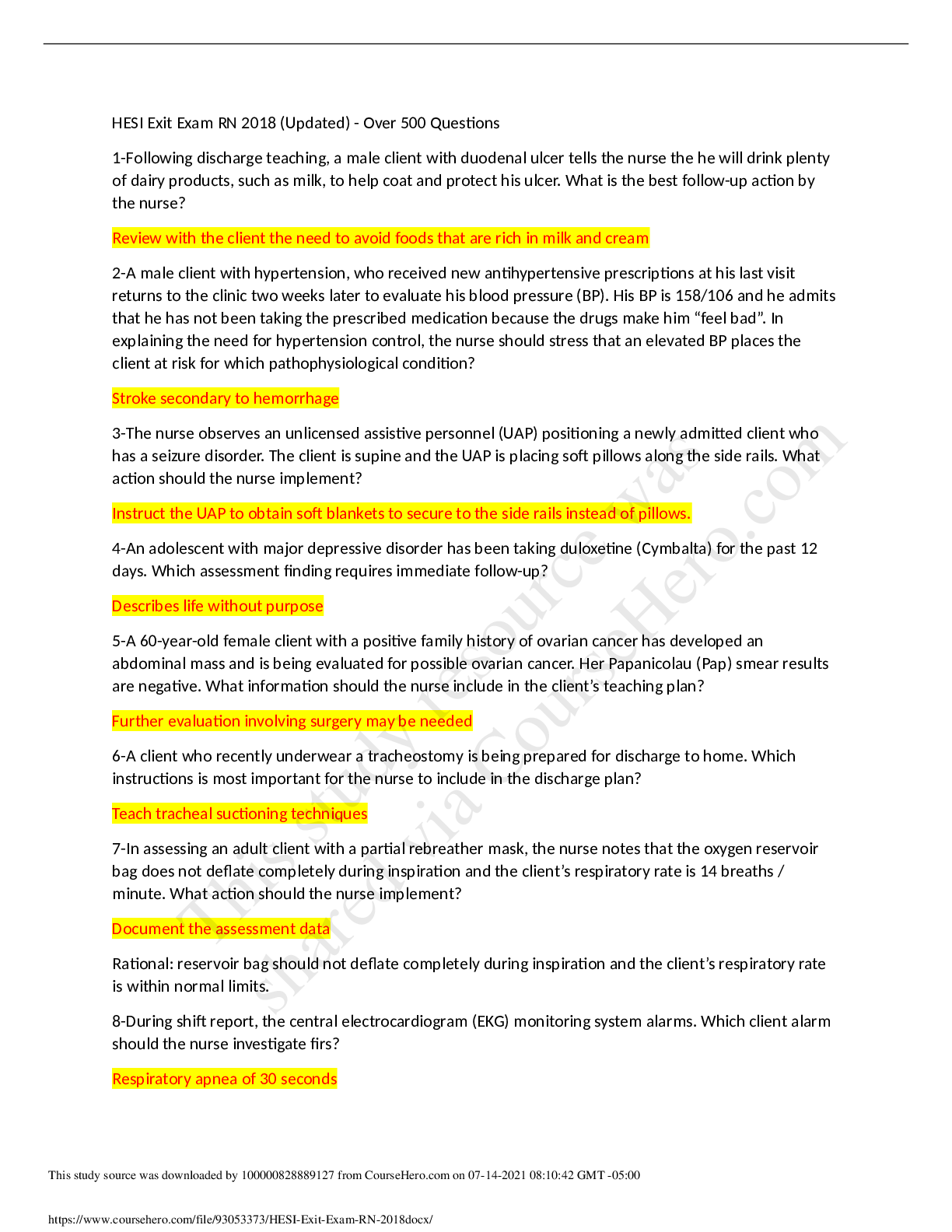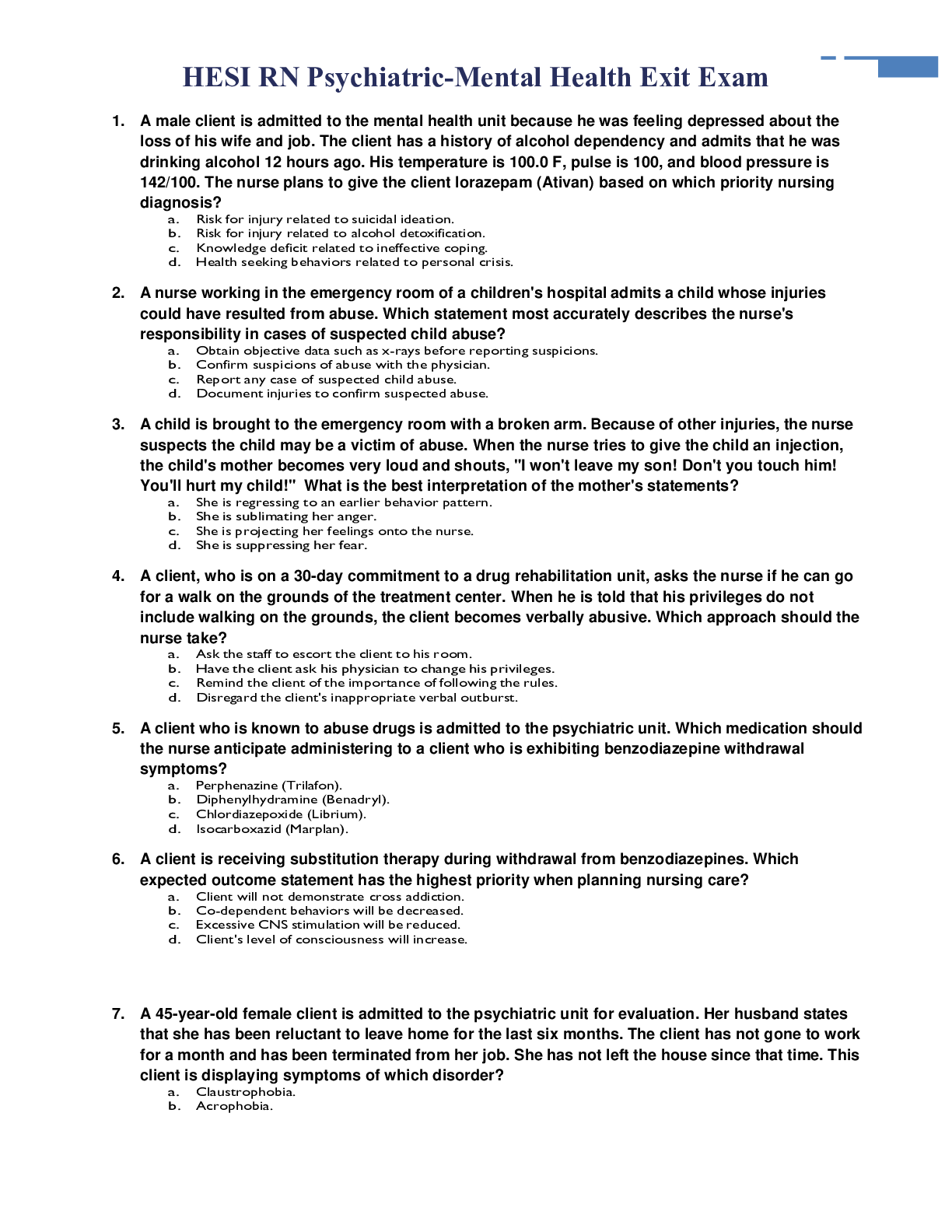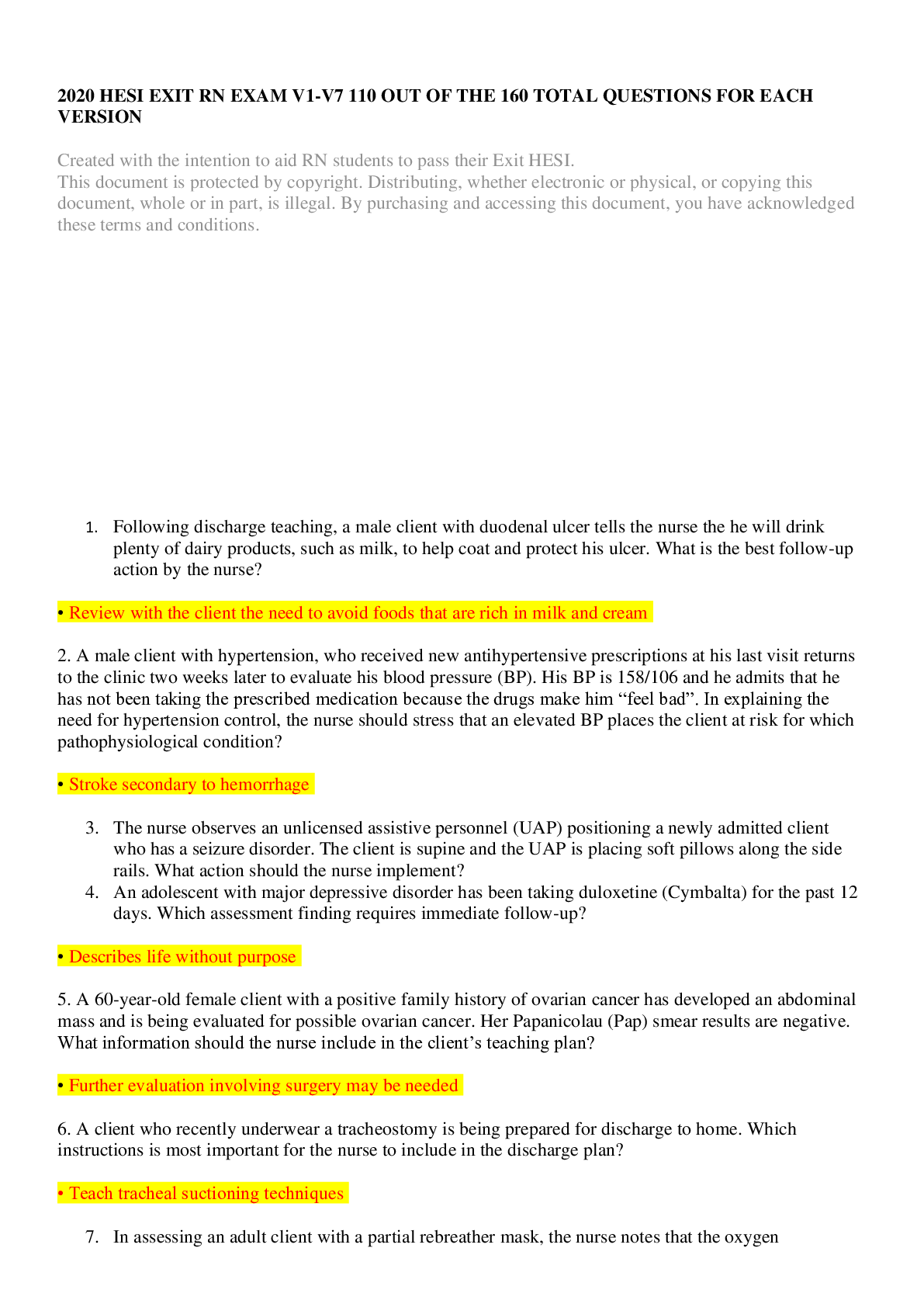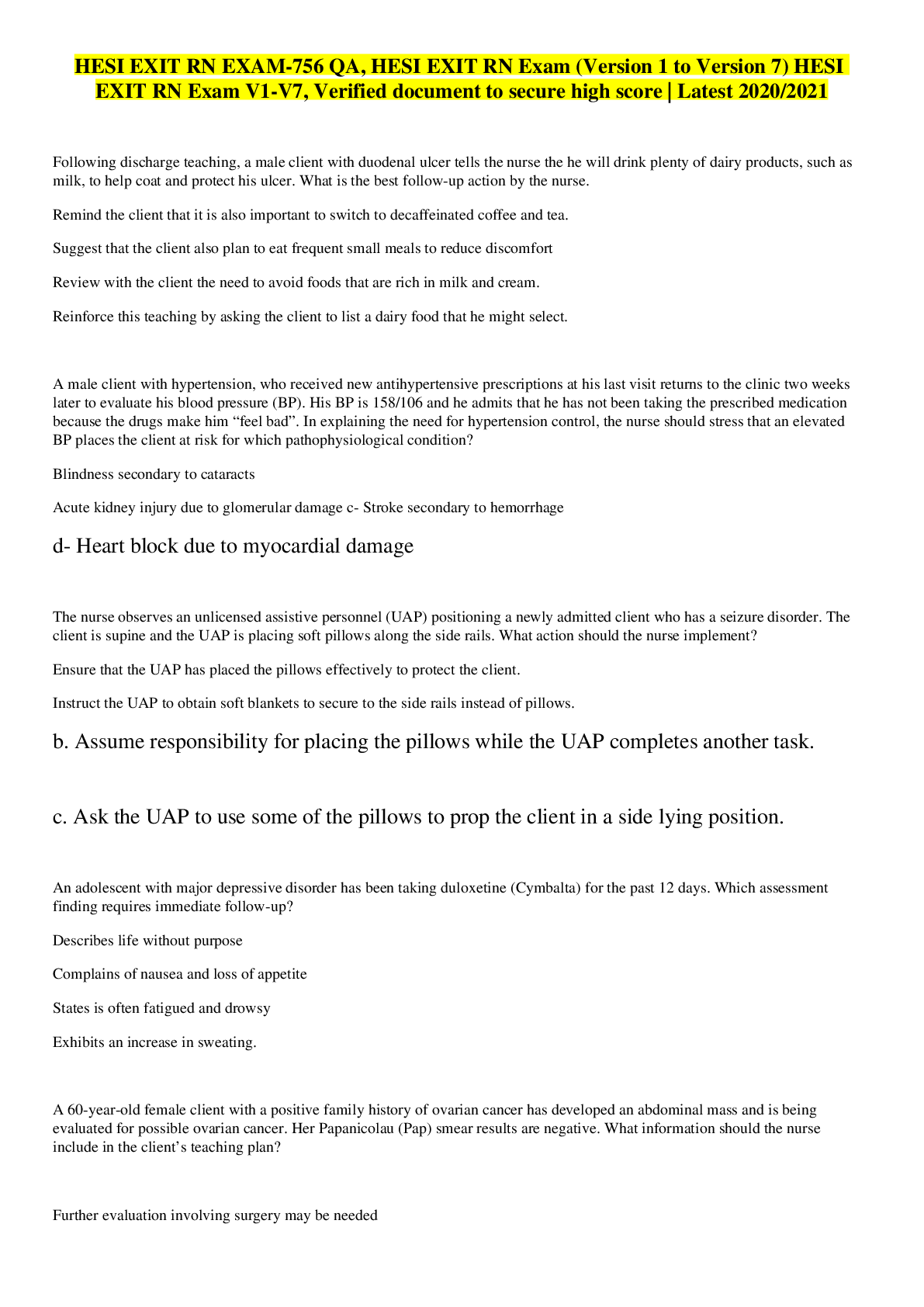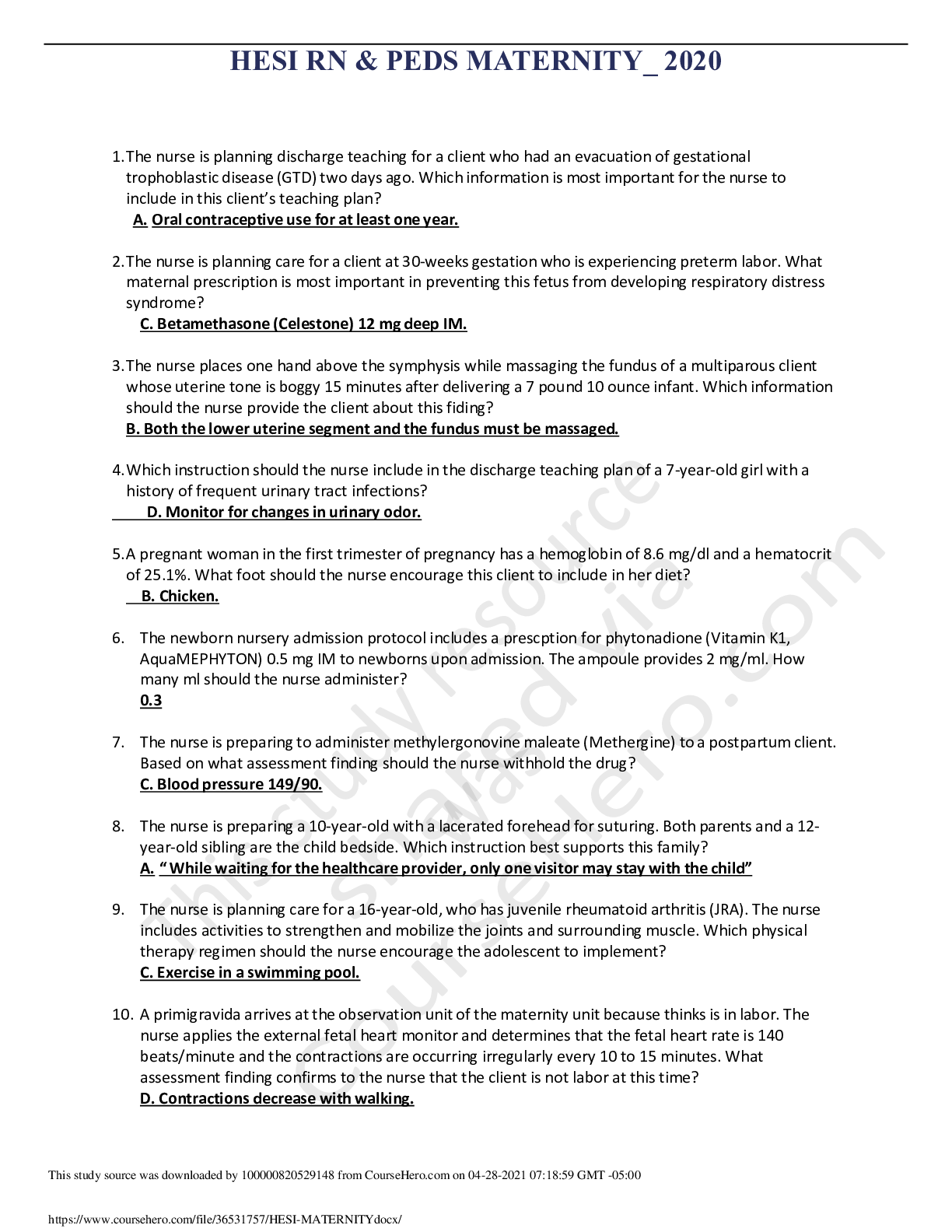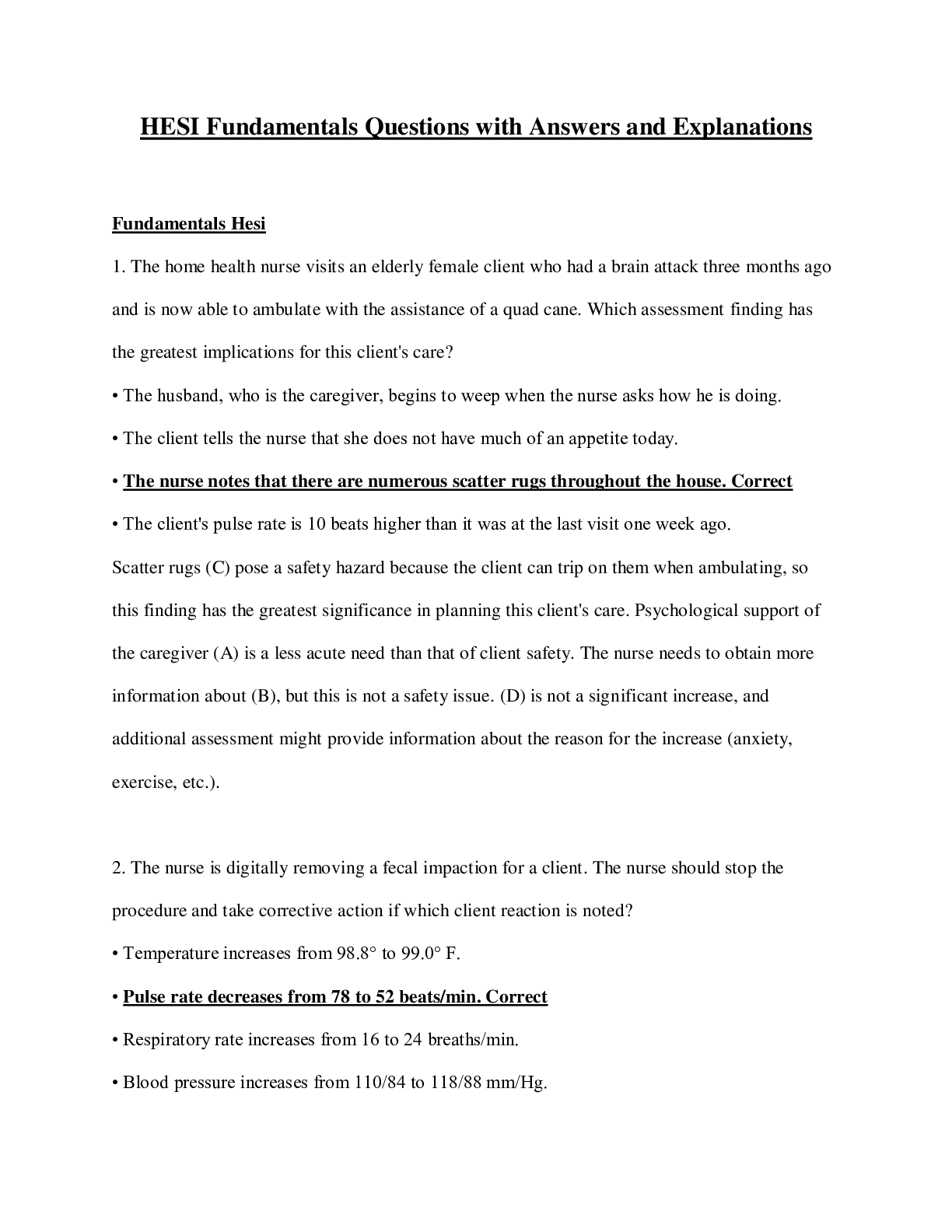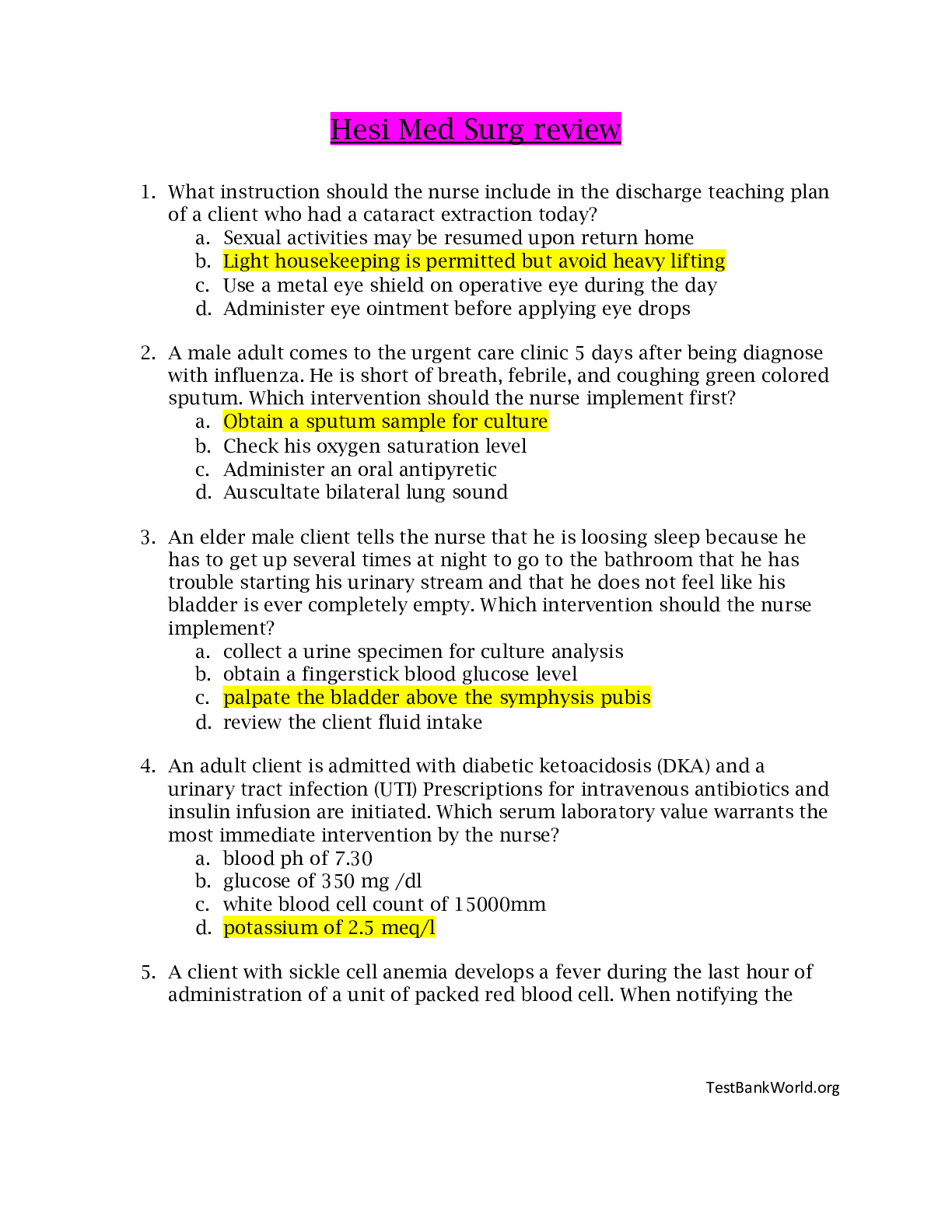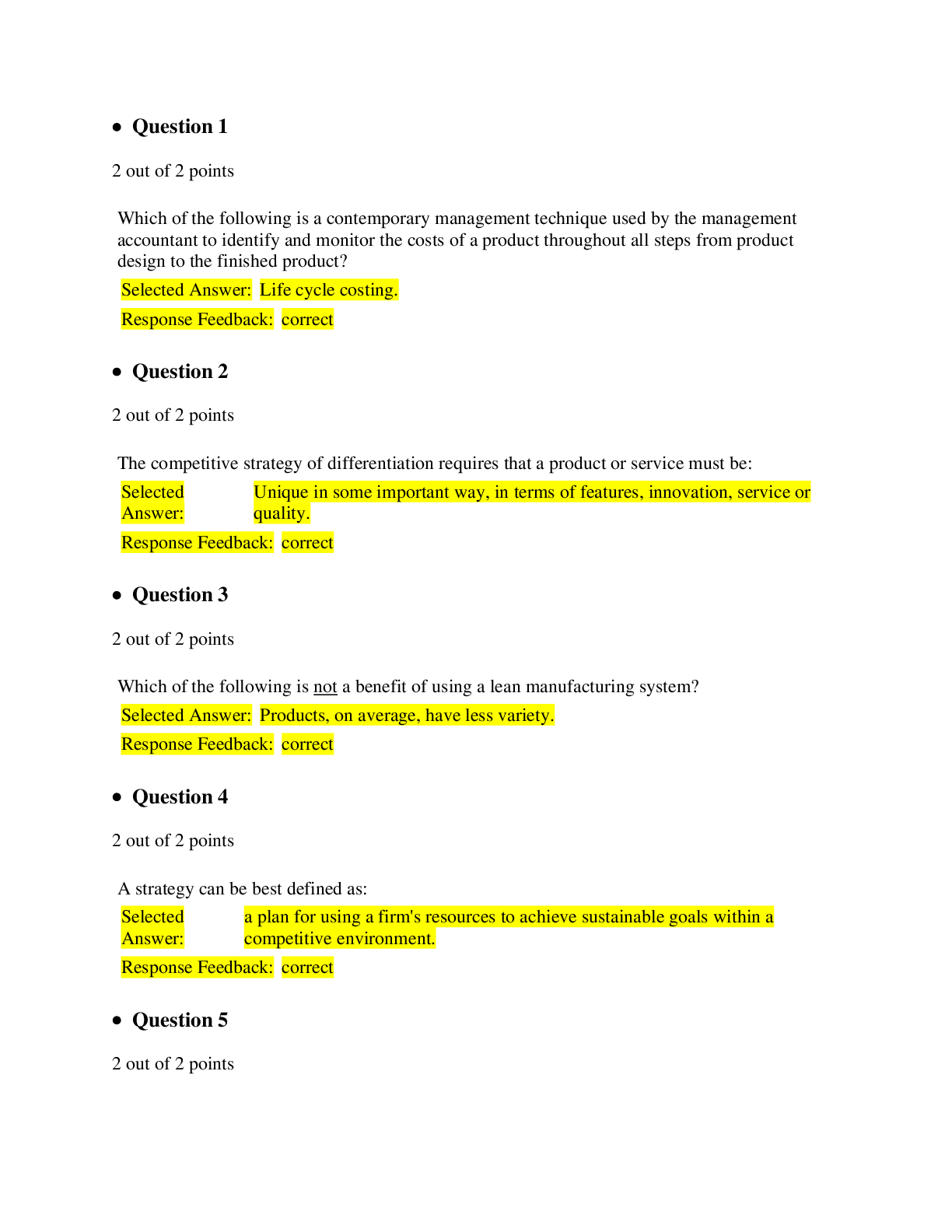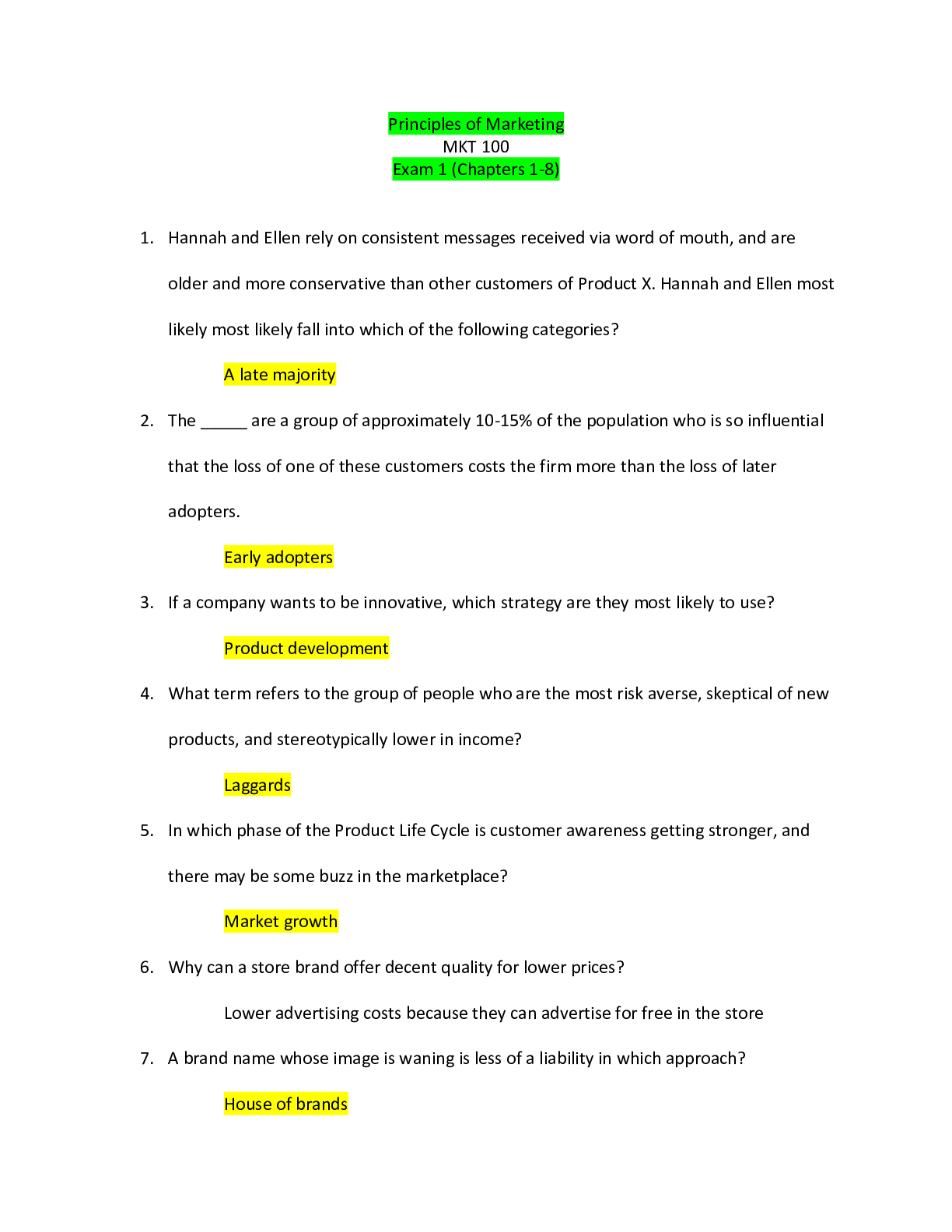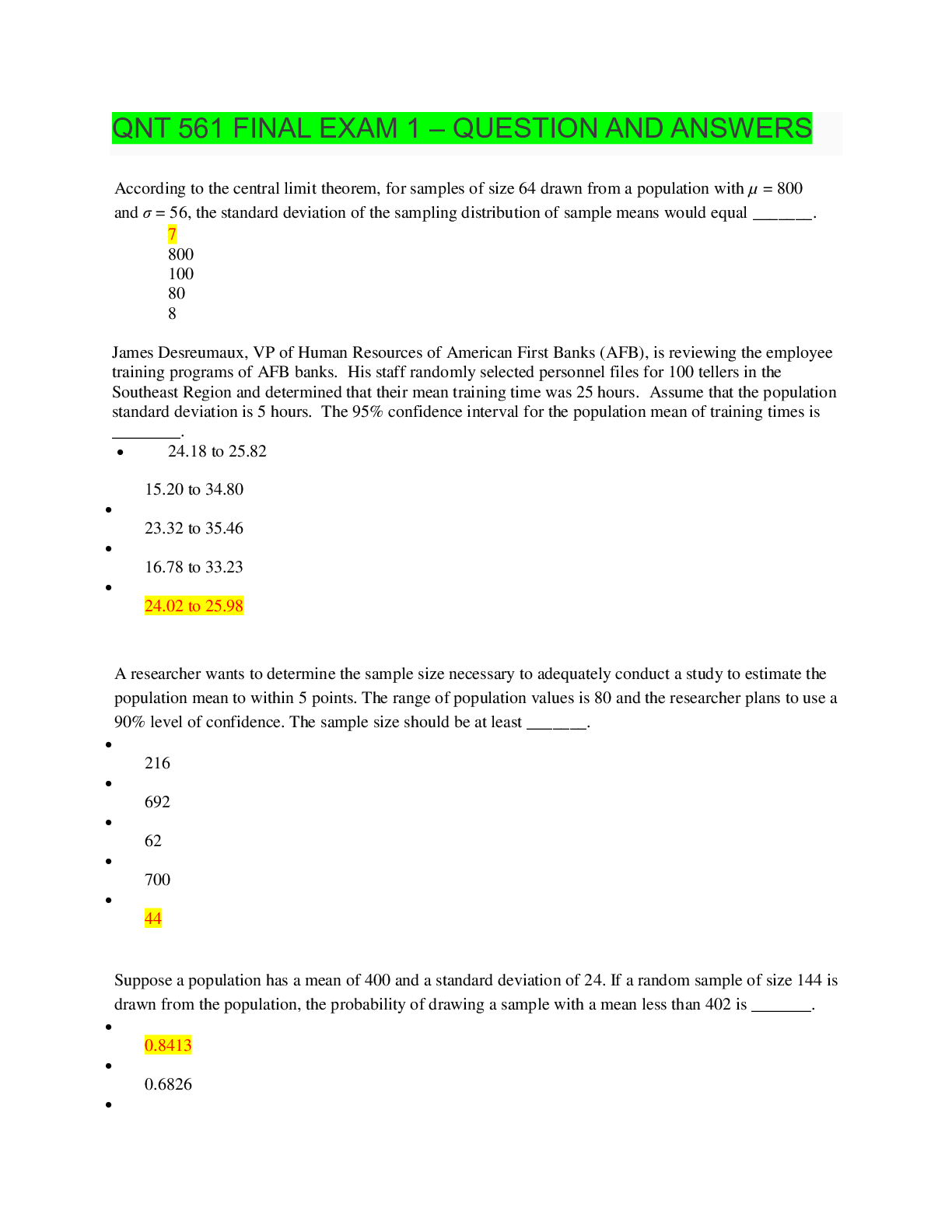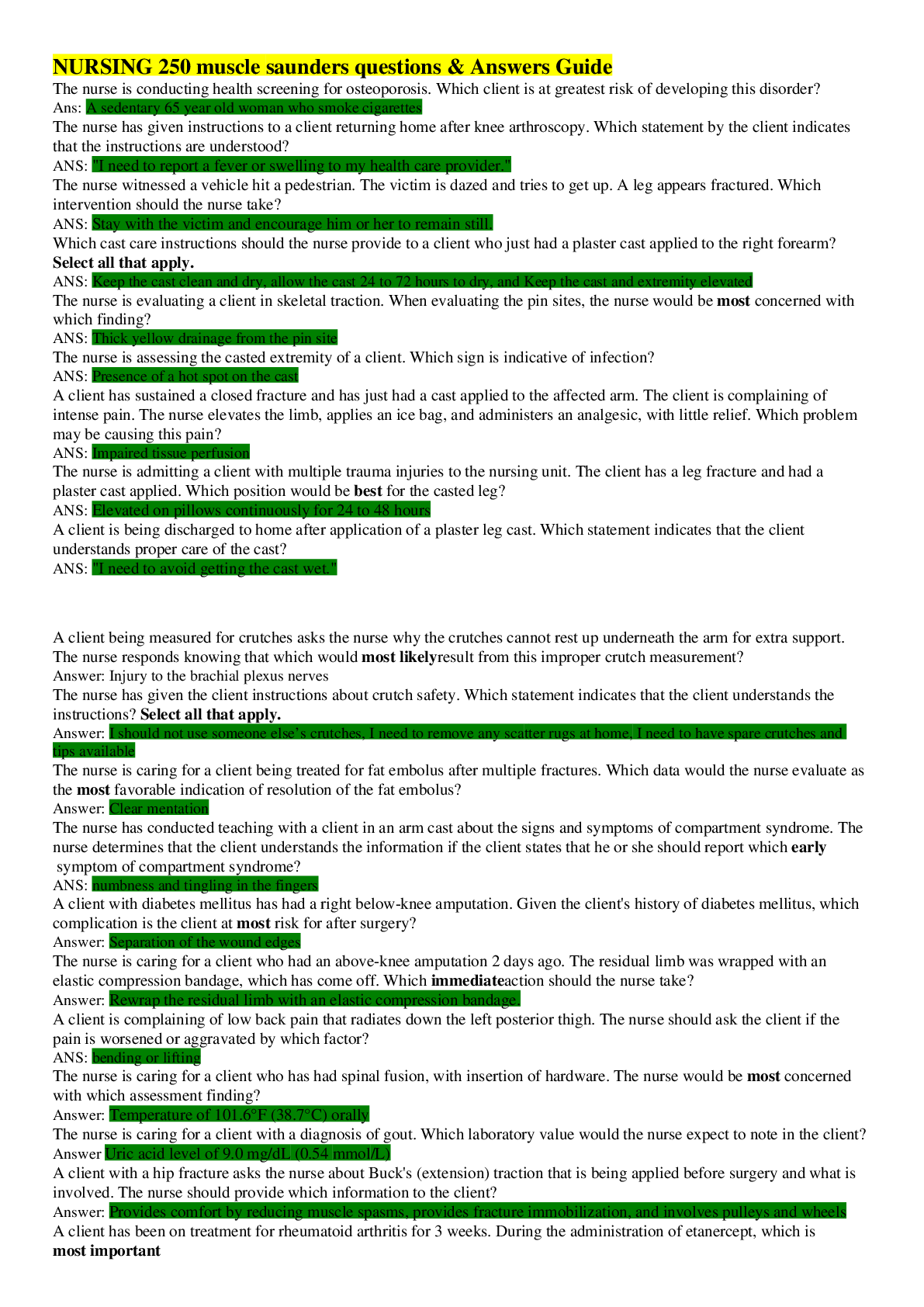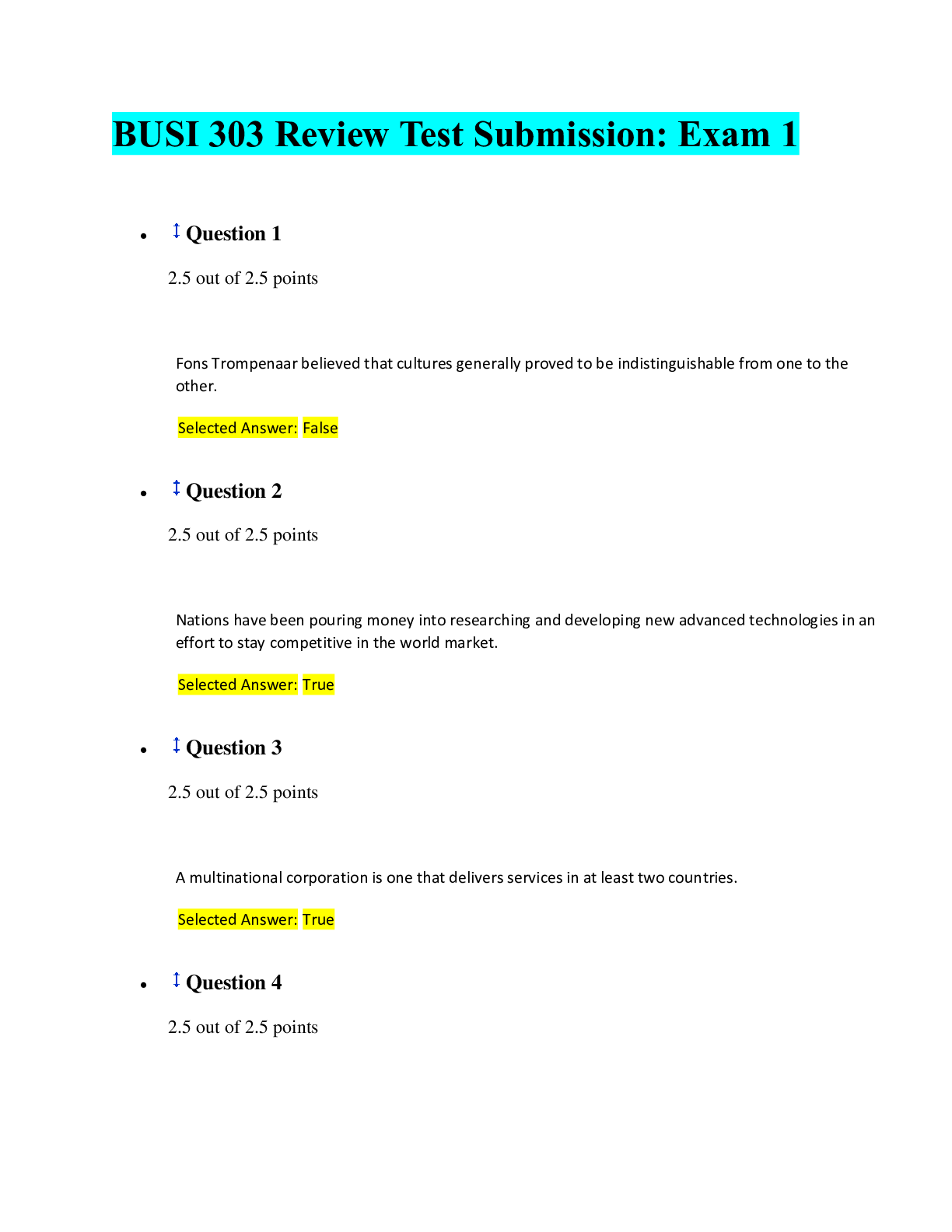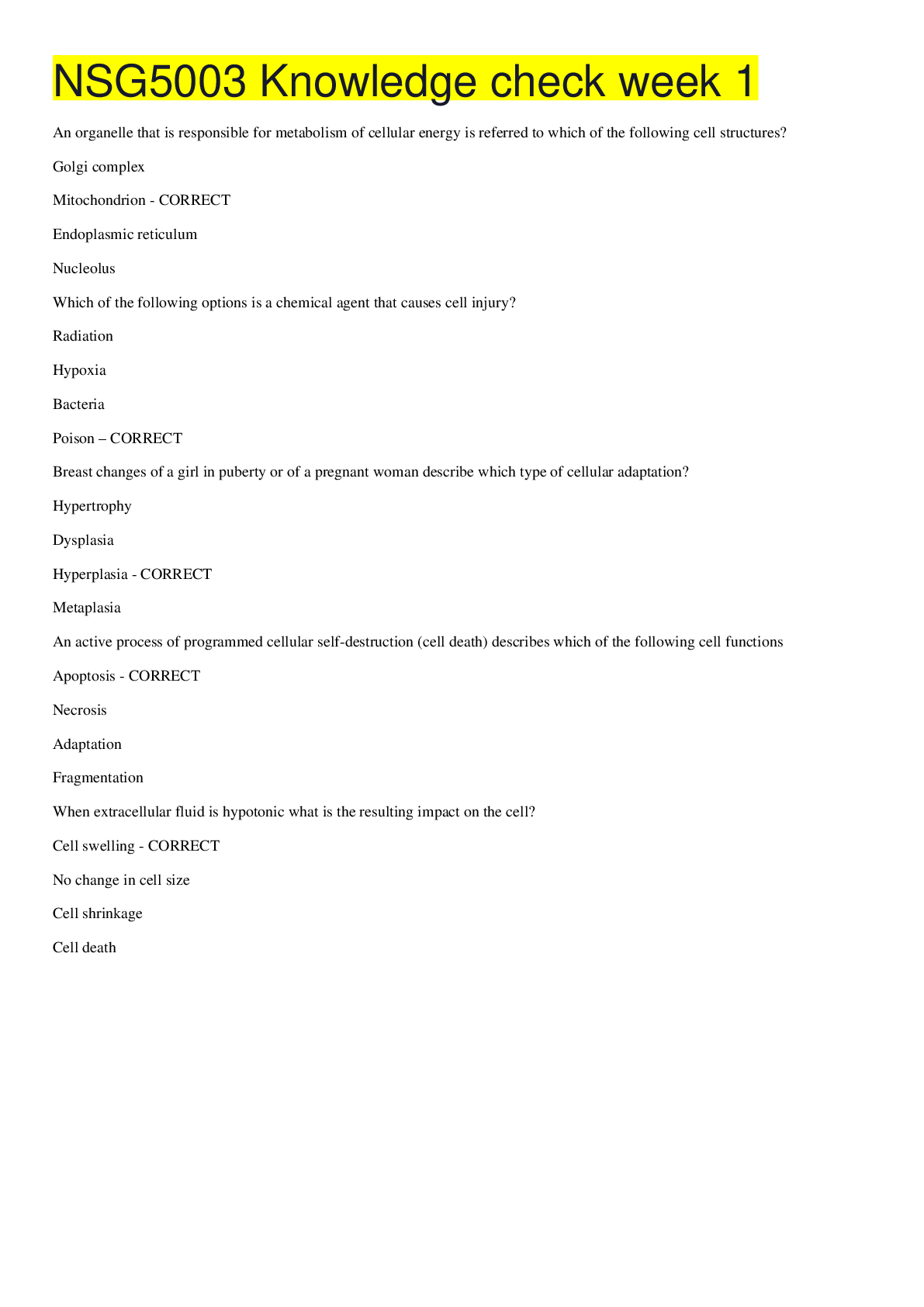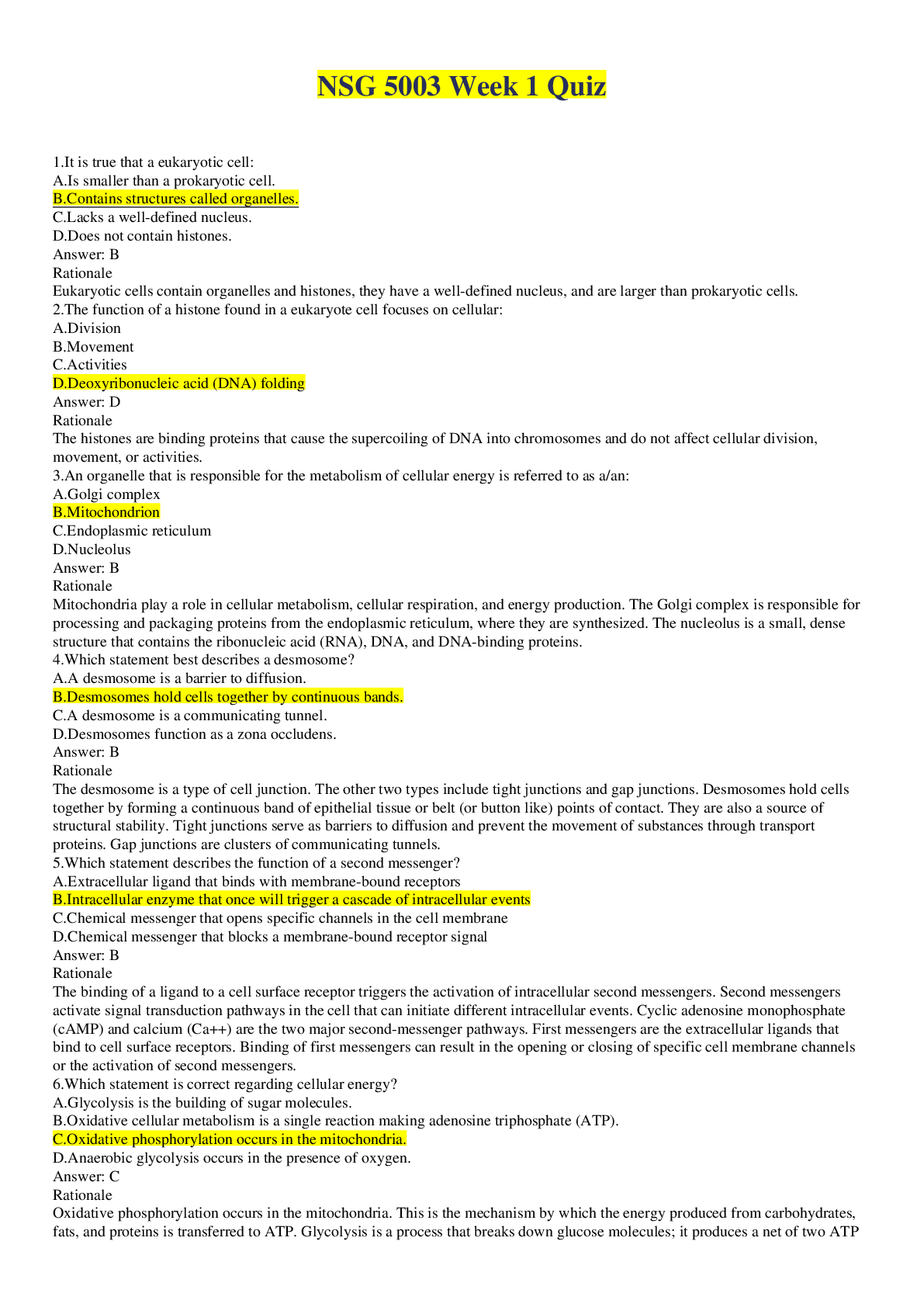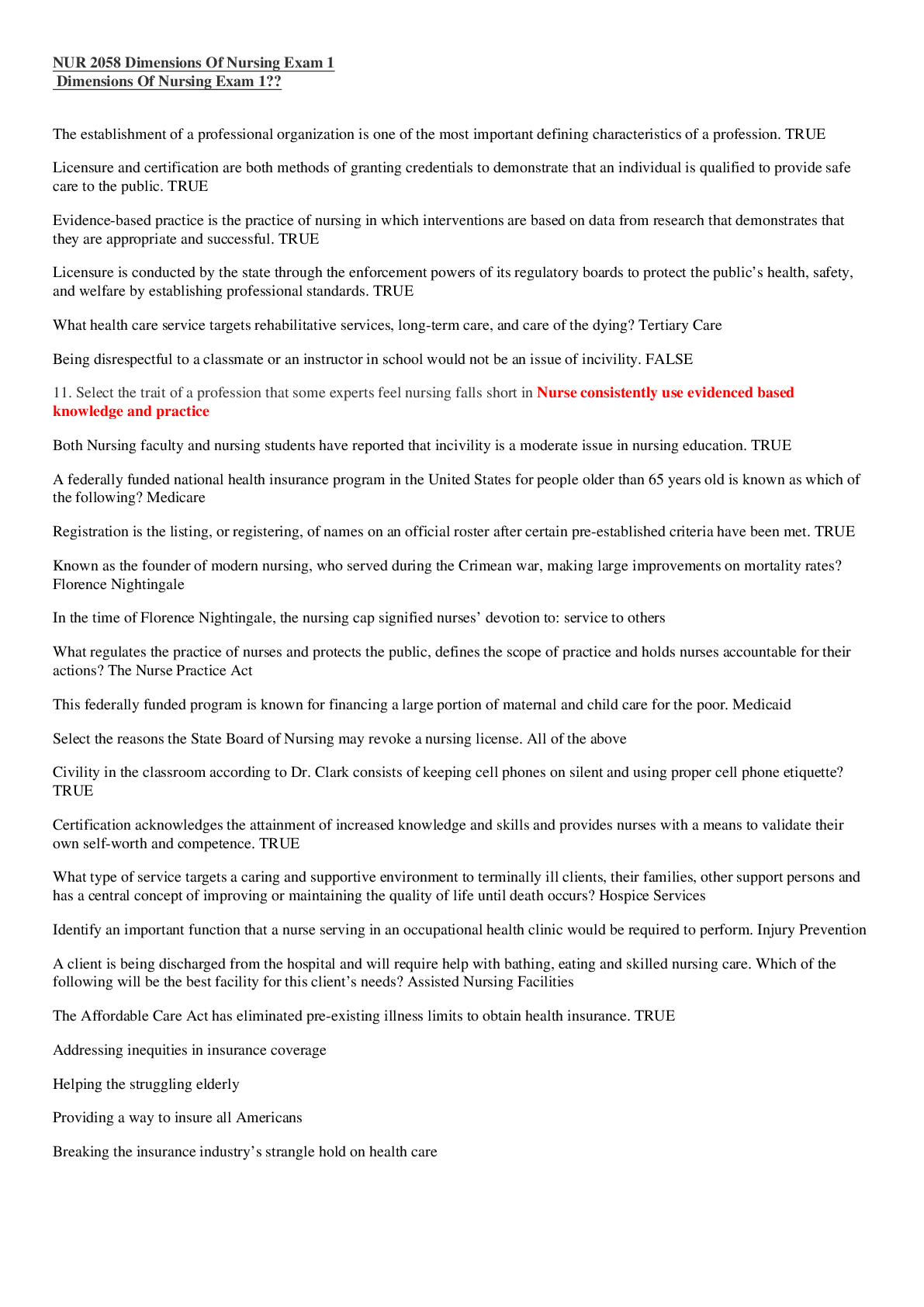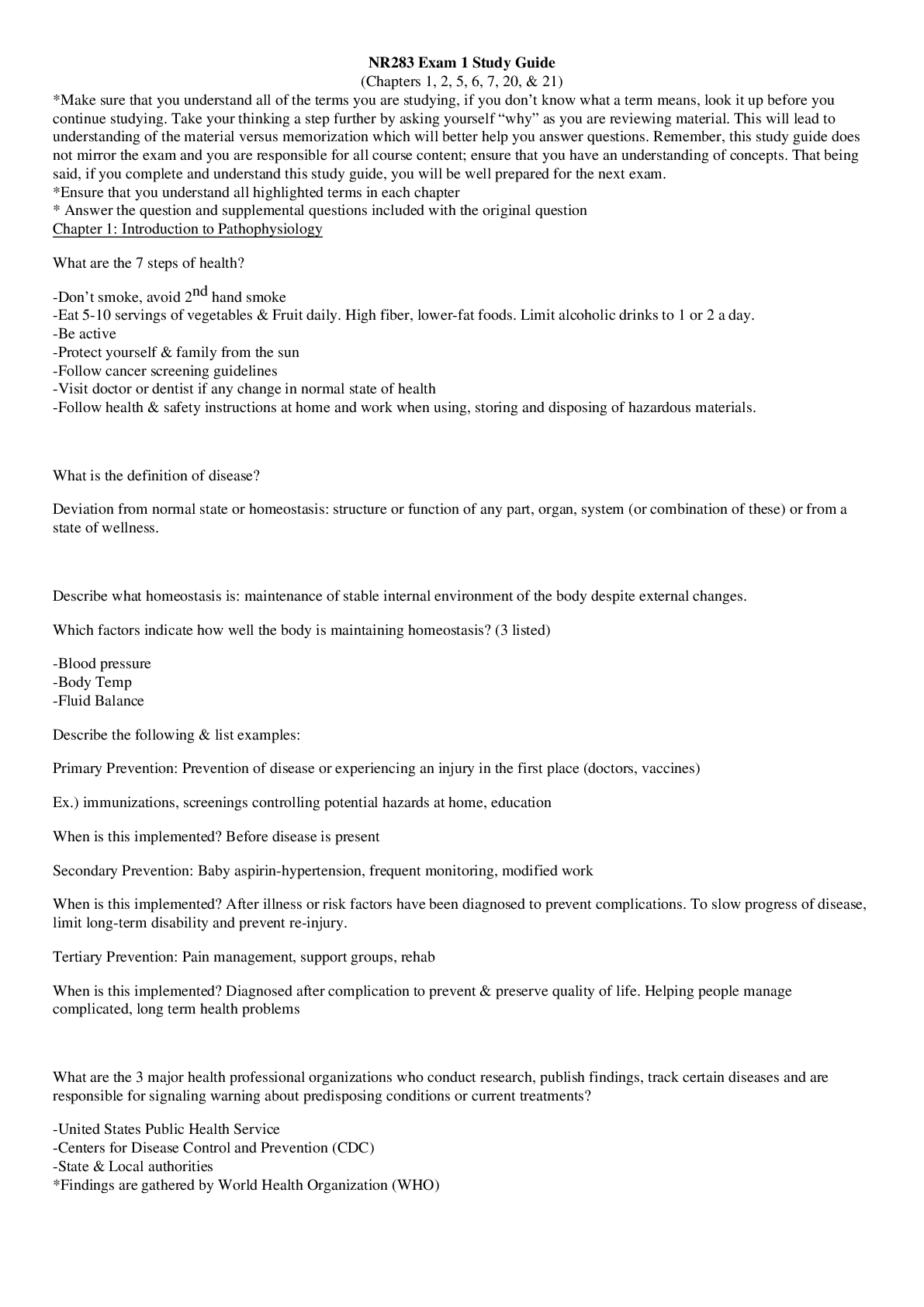*NURSING > EXAM > NUR 2488 Exam 1 ( 50 Q/A) / NUR2488 Exam 1 (Latest 2020): Mental Health Nursing: Rasmussen College | (All)
NUR 2488 Exam 1 ( 50 Q/A) / NUR2488 Exam 1 (Latest 2020): Mental Health Nursing: Rasmussen College | 100 % VERIFIED ANSWERS, GRADE A
Document Content and Description Below
NUR2488 Mental Health Nursing Exam 1 (Latest): Rasmussen College NUR2488 Exam 1 / NUR 2488 Exam 1 (Latest): Mental Health Nursing: Rasmussen College • Question 1 A fully developed outcome for a clie... nt goal would include: (SATA) Answers: Time sensitive Measurable terms Initial assessment Identifying data Attainable for client • Question 2 The nurse understands a client could be at risk for serotonin syndrome when taking which of the following medications in addition to over the counter medications or herbal supplements? Selected Answer: Haloperidol Answers: Sertraline Haloperidol Trazadone Venlafaxine • Question 3 A 4-year-old child grabs toys from siblings, saying, “I want that toy now!” The siblings cry and the child’s parent becomes upset with the behavior. Using Freudian theory, a nurse can interpret the child’s behavior as a product of impulses originating in the: Answers: Id Ego Superego Preconscious • Question 4 Which expected client outcome should a nurse identify as being correctly formulated? Answers: Client will feel happier by discharge. Client will demonstrate two relaxation techniques. Client will verbalize triggers to anger by end of session. Client will initiate interaction with one peer during free time within 2 days. • Question 5 A voluntarily hospitalized patient tells the nurse, “Get me the forms for discharge against medical advice so I can leave now.” Which is the nurse’s best response? Answers: “I can’t give you those forms without your health care provider’s knowledge.” “I’ll get the forms for you right now and bring them to your room.” “Since you signed your consent for treatment, you may leave if you desire.” “I will get them for you, but let’s talk about your decision to leave treatment.” • Question 6 The client is being admitted to the inpatient psychiatric unit. The nurse conducts a mental status examination. Which of the following items are included in this examination? (Select all that apply) Answers: Appearance Mood and Affect Thought Physical Exam Cognition • Question 7 A client with schizophrenia has recently begun a new medication, clozapine (Clozaril). Which signs and symptoms of a potentially fatal side effect will the nurse teach the client about? Answers: Blurring vision and muscular weakness Sore throat, fever, and malaise Tremor, shuffling gait, and neck stiffness Fine tremor, tinnitus, and nausea • Question 8 Which information suggests that caution is necessary in prescribing a benzodiazepine to an anxious client? Answers: The client has a history of alcohol dependence. The client has a history of diabetes mellitus. The client has a history of schizophrenia. The client has a history of hypertension. • Question 9 A brother calls to speak to his sister who has been admitted to the psychiatric unit. The nurse connects him to the community phone and the sister is summoned. Later the nurse realizes that the brother was not on the client’s approved call list. What law has the nurse broken? Answers: The National Alliance for the Mentally Ill Act The Tarasoff Ruling The Health Insurance Portability and Accountability Act The Good Samaritan Law • Question 10 The client attempted suicide by overdosing on pain medication. Once the client ingested the medication, she decided that she did not want to die and she sought immediate treatment. Once the client recovered from the physical effects of overdose, the client voluntarily sought inpatient mental health treatment. Which of the following statements is true of voluntary admission? Answers: The client is required to stay a minimum of 72 hours The client must have certification by two or more physicians Only a judge can determine if the client is able to be discharged The client retains the right to request release • Question 11 A nurse says to a client, “Things will look better tomorrow after a good night’s sleep.” This is an example of which communication technique? Answers: The therapeutic technique of giving advice The therapeutic technique of defending The nontherapeutic technique of presenting reality The nontherapeutic technique of giving reassurance • Question 12 A patient is involuntarily admitted to a psychiatric unit after calling a friend and saying, “I’ve got a gun and I’m going to shoot myself.” Which of the following rights has the patient lost temporarily? Answers: The right to communicate with family members Freedom of speech The right to refuse medications The right to leave the hospital without medical approval • Question 13 A depressed client states, “I have a chemical imbalance in my brain. I have no control over my behavior. Medications are my only hope to feel normal again.” Which nursing response is appropriate? Answers: “Medications are one way to address chemical imbalances. Environmental and interpersonal factors can also have an impact on biological factors.” “Because biological factors are the sole cause of depression, medications will improve your mood.” “Environmental factors have been shown to exert the most influence in the development of depression.” “Researchers have been unable to demonstrate a link between nature (biology and genetics) and nurture (environment).” • Question 14 During an intake interview, which question would assist the nurse in gathering data about the client’s judgment? Answers: “Do you know what day and season it is now?” “On a scale of 1 to 10, how would you rate your stress level?” “What does the phrase ‘a rolling stone gathers no moss’ mean to you?” “If you found a stamped, addressed envelope in the street, what would you do?” • Question 15 A nursing instructor asks a student to describe the nursing process when initiating care of a client. The student nurse understands the nursing process order to be correctly identified as: Answers: Assessment, Nursing Diagnosis, Outcomes, Planning, Implementation, Evaluation Assessment, Medical Diagnosis, Implementation, Planning, Outcomes and Evaluation Assessment, Nursing Diagnosis, Implementation, Planning, Outcomes, and Evaluation Assessment, Medical Diagnosis, Planning, Outcomes, Implementation and Evaluation • Question 16 During an intake assessment, a nurse asks both physiological and psychosocial questions. The client angrily responds, “I’m here for my heart, not my head problems.” Which is the nurse’s best response? Answers: “It’s just a routine part of our assessment. All clients are asked these questions, you need to answer them.” “Why are you concerned about these types of questions?” “Psychological factors, like excessive stress, have been found to affect medical conditions.” “We can skip these questions, if you like. It isn’t imperative that we complete this section.” • Question 17 A mother rescues two of her four children from a house fire. In an emergency department, she cries, “I should have gone back in to get them. I should have died, not them.” Which of the following responses by the nurse is an example of reflection? Answers: “The smoke was too thick. You couldn’t have gone back in.” “You’re feeling guilty because you weren’t able to save your children.” “Focus on the fact that you could have lost all four of your children.” “It’s best if you try not to think about what happened. Try to move on.” • Question 18 An entry level registered nurse works with patients in a community setting. Which groups should this nurse expect to lead? (Select all that apply.) Answers: Symptom management Family therapy Medication education Psychotherapy Self-care • Question 19 A client has been involuntarily admitted to an inpatient behavioral health unit. During this admission, which of the following rights does the client still retain? (Select all that apply.) The right to informed consent Answers: The right to refuse medications The right to keep all personal items The right to informed consent The right to choose the nurse assigned to them • Question 20 A mother who is notified that her child was killed in a tragic car accident states, “I can’t bear to go on with my life.” Which nursing statement conveys empathy? Answers: “This situation is very sad, but time is a great healer.” “You are sad, but you must be strong for your other children.” “Once you cry it all out, things will seem so much better.” “It must be horrible to lose a child, and I’ll stay with you until your husband arrives.” • Question 21 During the implementation phase of the nursing process, a nurse is teaching an adult depressed patient with a cochlear implant about medications. Which modification in the teaching plan would be the most appropriate for this client? Answers: Using repetition Speaking directly face-to-face Employing the use of sign language Providing large-print materials • Question 22 A 22 year old college student is admitted to a hospital following a suicide attempt and states, “No one will ever love a loser like me.” According to Erikson’s theory of personality development, a nurse should recognize a deficit in which developmental stage? Answers: Trust versus mistrust Ego integrity versus despair Intimacy versus isolation Initiative versus guilt • Question 23 A nursing instructor is teaching about the monoamine category of neurotransmitters. Which student statement indicates that learning about the function of norepinephrine has occurred? Answers: Norepinephrine functions to regulate movement, coordination, and emotions. Norepinephrine functions to regulate mood, cognition, and perception. Norepinephrine functions to regulate arousal, libido, and appetite. Norepinephrine functions to regulate pain, inflammatory response, and wakefulness. • Question 24 A nurse is educating a patient about the difference between mental health and mental illness. Which statement by the patient reflects an accurate understanding of mental health? Selected Answer: Mental health is successful adaptation to stressors in the internal and external environment. Answers: Mental health is the absence of any stressors. Mental health is successful adaptation to stressors in the internal and external environment. Mental health is incongruence between thoughts, feelings, and behavior Mental health is a diagnostic category in the DSM-5. • Question 25 The nurse understands a client taking which medication could place a client at high risk for a life-threatening hypertensive crisis if tyramine is ingested? (Select All That Apply) Answers: A client taking tranylcypromine (Parnate) A client taking isocarboxazid (Marplan) A client taking venlafaxine (Effexor) A client taking phenelzine (Nardil) A client taking sertraline (Zoloft) • Question 26 A client was recently admitted to the inpatient unit after a suicide attempt and has not responded to SSRIs or tricyclic antidepressants. The client asks the nurse, “I heard about MAOIs (monoamine oxidase inhibitors). Why can't they be added to what I am on now? Wouldn't adding one help?” Which is the appropriate nursing response? Answers: “Electroconvulsive therapy (ECT) is your best option at this point.” “Combined use can lead to a life-threatening condition called a hypertensive crisis.” “There is no reason why an MAOI couldn’t be added to your therapy.” “They can't be used together because their mechanisms of action are very different.” • Question 27 A 29-year-old client living with parents has few interpersonal relationships. The client states, “I have trouble trusting people.” Based on Erikson’s developmental theory, which should the nurse recognize as true statements about the client? (Select All That Apply) Answers: The client not has progressed beyond the trust versus mistrust developmental stage. Developmental deficits in earlier life stages have impaired the client’s adult functioning. The client cannot move to the next developmental stage until mastering all earlier stages The client’s developmental problems began in the intimacy versus isolation stage. • Question 28 A patient discloses several concerns and associated feelings. If the nurse wishes to seek clarification, which comment would be most appropriate? Selected Answer: “Am I correct in understanding that . . .” Answers: “What are the common elements here?” “Tell me again about your experiences.” “Am I correct in understanding that . . .” “Tell me everything from the beginning.” • Question 29 The health care provider prescribes an antidepressant for an elderly client, but nurse notices that the dosage is greater than the usual adult dosage. Which of the following best describes what action the nurse should take? Answers: Consult a drug reference guide Implement the order as written Administer the usual geriatric dosage Hold the medication until clarified with the health care provider • Question 30 Which intervention by a psychiatric nurse best utilizes the ethical principle of autonomy? The nurse: Answers: Stays with a patient who is demonstrating a high level of anxiety Suggests that two patients who were fighting be restricted to the unit Explores alternative solutions with a patient, who then makes a choice Intervenes when a self-mutilating patient attempts to harm self • Question 31 Which of the following should the nurse plan to include in the assessment of an older adult client? Answers: Ask all questions in the order they are presented on the formal assessment tool. Interpret all data objectively without consideration of context of the client’s spiritual or cultural beliefs. Share all pertinent information with the family after leaving the patient. Identify physical needs and necessary accommodations for this client. • Question 32 A patient is about to be released and tells the staff nurse “I’m glad I’m getting out of here; I swear the first thing I’ll do is kill my ex-wife and that stupid boyfriend of hers.” Which of the following is the staff nurse’s legal duty? Answers: Obtain an order for an increase in the patient’s medication before discharge. Warn the patient’s ex-wife and boyfriend. Keep this information confidential to avoid legal action. Report the threat to the treatment team and document the statement • Question 33 A client tells a nurse that he hates his doctor and plans to hurt the doctor, but she did not report this prior to leaving. When the nurse returns to work the next day, she finds that the physician has been brutally beaten by the client and the physician is hospitalized. Which of the following best represents the nurse’s failure to act by not reporting the client’s intent? Answers: Carelessness Assault and battery Negligence Slander • Question 34 A newly admitted patient is hyperactive, restless, and disorganized. The patient goes to the dining room and begins to throw food. Verbal intervention is ineffective. Seclusion is instituted for the primary purpose of: Answers: Isolating the patient until his prn medication can take effect. Reducing environmental stimuli that negatively affect the patient. Limit setting and encouraging the patient to follow unit rules. Preventing other patients from observing the behavior. • Question 35 A Mexican American patient puts a picture of the Virgin Mary on the bedside table. Under which section of the assessment should the nurse document this behavior? Answers: Ethnicity Culture Verbal communication Non-verbal communication • Question 36 Which one of the following best represents a potential liability issue for the professional nurse? Answers: Restraining a combative patient who is stabbing himself with a pencil. Reporting threats of violence made by a patient against his employer. Calling the psychiatric nurse practitioner to clarify an order for an antipsychotic. Placing a patient who talks constantly and loudly into a secluded room alone. • Question 37 A researcher tells the nurse that she would like a patient to participate in a study on the effects of a new medication. The nurse’s responsibility in regard to this study is: Answers: To tell the patient about the benefits of the study and encourage participation. To gather data that the researcher requests. To assess whether the patient has the ability and legal right to give informed consent. To coach the patient in how she should answer questions and behave during the study. • Question 38 A nurse is performing a mental health assessment on an adult client. According to Maslow’s hierarchy of needs, which client action would demonstrate the highest achievement in terms of mental health? Answers: Maintaining a long-term, faithful, intimate relationship Achieving a sense of self-confidence Possessing a feeling of self-fulfillment and realizing full potential Developing a sense of purpose and the ability to direct activities • Question 39 A nurse explains to the family of a mentally ill patient how the nurse-patient relationship differs from other interpersonal relationships. Which is the nurse’s best explanation? Answers: “The focus is on the patient. Problems are discussed by the nurse and patient; but solutions are implemented by the patient.” “The focus is creation of a partnership in which each member is concerned with being a “friend”. “The focus of the relationship is socialization. Mutual needs are met and feelings are shared openly.” “The focus shifts from nurse to patient as the relationship develops. Advice is given by both and solutions are implemented.” • Question 40 A client who is very dirty and has an offensive odor refused to take a shower when he was admitted to the psychiatric inpatient unit of the hospital. He yelled, “No, no, no bath!” when two staff members carried him into the shower and made him wash himself thoroughly before allowing him to leave the shower area. Which of these statements is correct regarding this patient’s rights? Answers: There was no violation because an intake shower is required for all new patients, not just this patient There was no violation of patient rights because this is considered a potential threat to self, due to inappropriate hygiene. This was a violation of patient rights because the patient was restrained by force. There was a rights violation due to excessive verbal interventions. • Question 41 The nurse is assessing a client who has a diagnosis of schizophrenia and takes a typical antipsychotic agent daily. Which assessment finding should alert the nurse to a potential adverse effect of a typical antipsychotic medications? Answers: Respirations of 22 breathes/minute Weight gain of 8 pounds in 2 months Temperature of 101oF Excess salivation • Question 42 Using Erickson’s theory of personality development, which of the following task occur with teenagers during puberty? Answers: Develop abstract thinking Forming sexual relationships Identifying oneself from one’s parents Sensing the flow of time, past, present and future Type MA: • Question 43 According to Freud, which statement should a nurse associate with predominance of the superego? Answers: “No one is looking, so I will take three cigarettes from Mom’s pack.” “I don’t ever cheat on tests; it is wrong.” “I think I may skip school today, I need a break.” “Dad won’t miss this little bit of vodka.” • Question 44 An inpatient psychiatric physician treating clients omits treatment options for those without insurance. Which violation of an ethical principle should a nurse recognize in this situation? Selected Answer: Justice Answers: Autonomy Beneficence Non-maleficence Justice • Question 45 During a nurse–client interaction, which nursing statement may belittle the client’s feelings and concerns? Answers: “Don’t worry. Everything will be alright.” “You appear uptight.” “I notice you have bitten your nails to the quick.” “Tell me more about your feelings.” • Question 46 A nurse assessed a patient who participated reluctantly, answered questions with minimal responses, and rarely made eye contact. What data should be included when documenting the assessment? Selected Answer: A description of the patient’s behavior during the interview Answers: Only data obtained from the patient’s verbal responses The observation that the patient was uncooperative Analysis of why the patient did not respond openly during the interview A description of the patient’s behavior during the interview • Question 47 Which client action should a nurse expect during the working phase of the nurse-client relationship? Answers: The client gains insight and incorporates alternative behaviors. The client establishes rapport with the nurse builds trust. The client explores feelings related to reentering the community. The client outlines problems to be discussed. • Question 48 The nurse is conversing with a client in a locked in-patient psychiatric unit. The client states,” Please don’t tell anyone about my sexual abuse.” Which nursing response clearly outlines the professional nurse’s responsibility related to confidentiality? Answers: “Yes, I will keep this information confidential.” “All of the health-care team is focusing on helping you. I will bring information to the team that can assist them in planning your treatment.” “Why don’t you want the team to know about your sexual abuse? It is essential information.” “Let’s talk about your feelings about your history of sexual abuse?” • Question 49 Within professional scope of practice, which function is exclusive to the advanced nurse practice specialty? Answers: Teaching about the side effects of MAOI medications. Using psychotherapy to improve mental health status Using milieu therapy to structure a therapeutic environment Providing case management to coordinate continuity of health services • Question 50 A physically healthy, 35-year-old single client lives with parents who provide total financial support. According to Erikson’s theory, which developmental task should a nurse assist the client to accomplish? Answers: Establishing the ability to control emotional reactions Establishing a strong sense of ethics and character structure Establishing and maintaining self-esteem Establishing a career, personal relationships, and societal connections [Show More]
Last updated: 1 year ago
Preview 1 out of 51 pages
Instant download
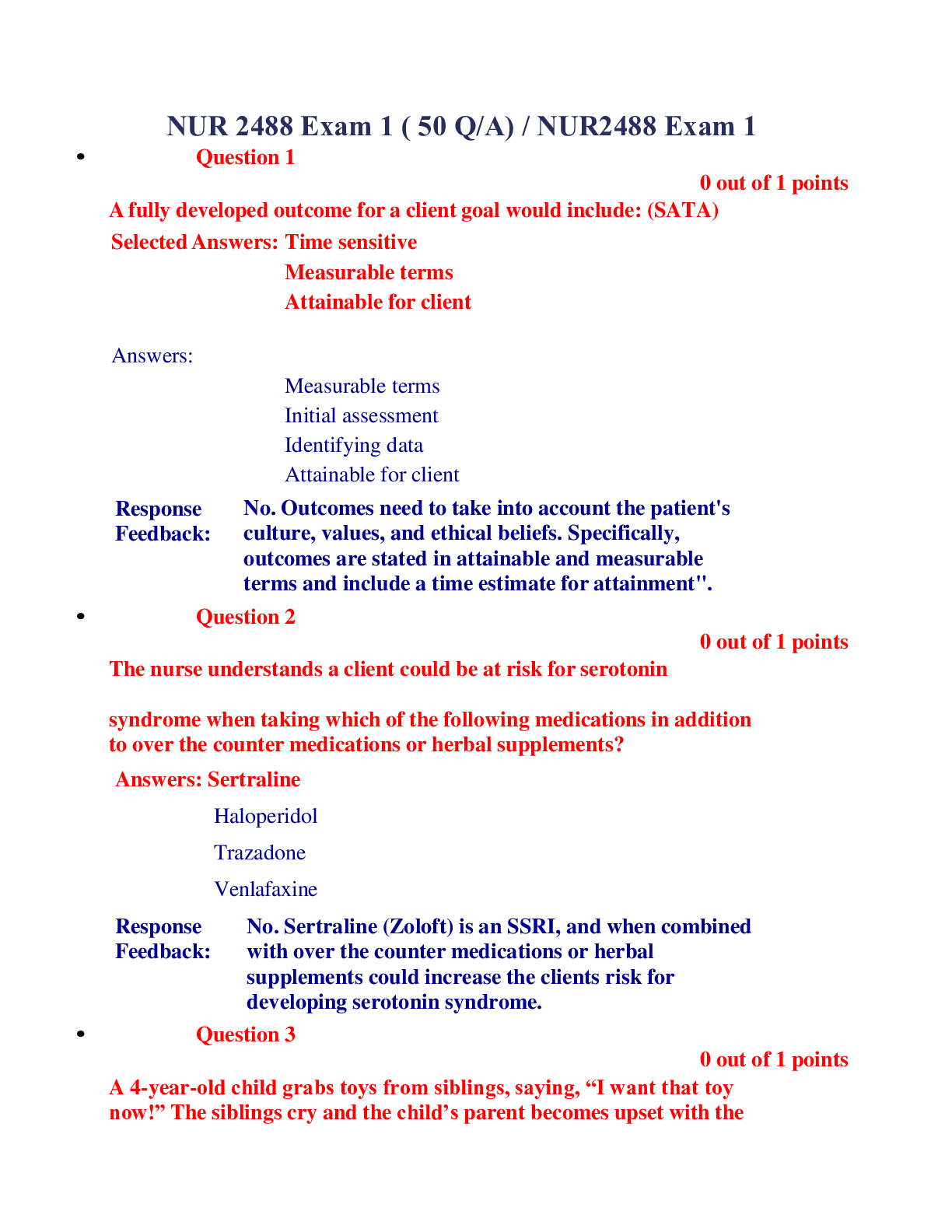
Buy this document to get the full access instantly
Instant Download Access after purchase
Add to cartInstant download
Reviews( 0 )
Document information
Connected school, study & course
About the document
Uploaded On
Mar 30, 2021
Number of pages
51
Written in
Additional information
This document has been written for:
Uploaded
Mar 30, 2021
Downloads
0
Views
117

